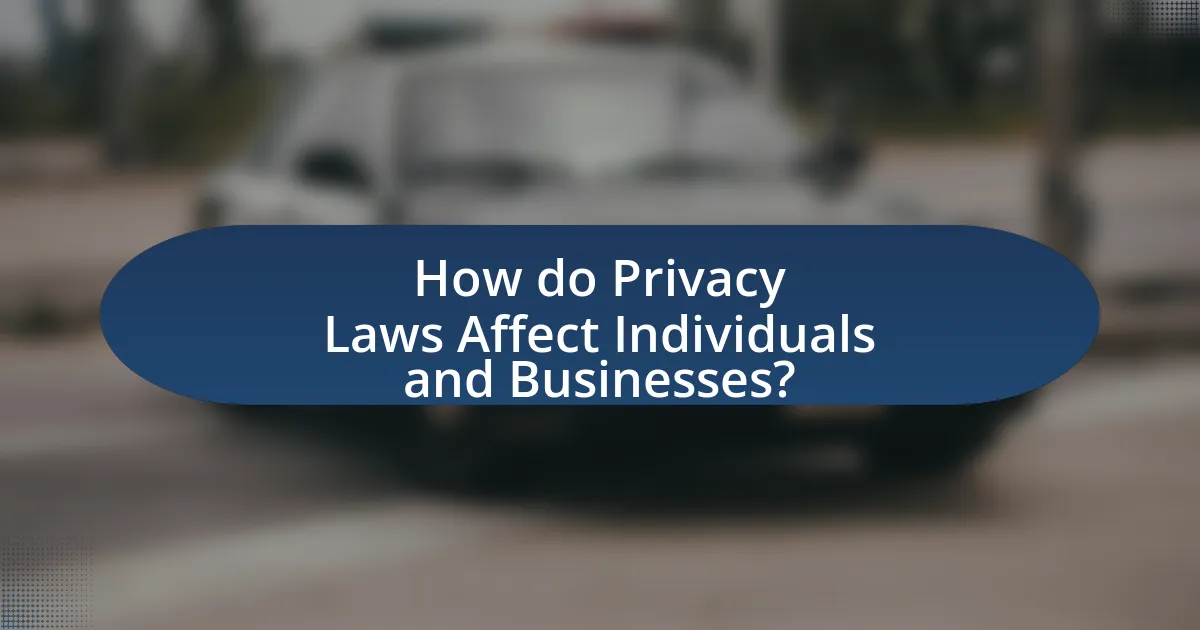Privacy laws are regulations that govern the collection, storage, and use of personal information by organizations and governments, playing a crucial role in protecting individuals’ rights to privacy. This article provides an overview of privacy laws worldwide, highlighting key regulations such as the General Data Protection Regulation (GDPR) in the European Union, the California Consumer Privacy Act (CCPA) in the United States, and Brazil’s General Data Protection Law (LGPD). It examines how privacy laws vary across countries, the fundamental principles that underpin these regulations, and the rights individuals possess under them. Additionally, the article discusses the implications of non-compliance for businesses, the impact of emerging technologies on privacy legislation, and practical steps individuals can take to safeguard their privacy.

What are Privacy Laws and Why are They Important?
Privacy laws are regulations that govern the collection, storage, and use of personal information by organizations and governments. These laws are important because they protect individuals’ rights to privacy, ensuring that their personal data is handled responsibly and securely. For instance, the General Data Protection Regulation (GDPR) in the European Union mandates strict guidelines for data protection, giving individuals greater control over their personal information and imposing significant penalties for non-compliance. This legal framework helps to prevent data breaches and misuse of personal data, fostering trust between consumers and organizations.
How do Privacy Laws vary across different countries?
Privacy laws vary significantly across different countries, influenced by cultural, legal, and political factors. For instance, the European Union’s General Data Protection Regulation (GDPR) establishes stringent data protection standards, emphasizing individual consent and data subject rights, while countries like the United States adopt a more sectoral approach, with laws such as the California Consumer Privacy Act (CCPA) focusing on specific industries rather than comprehensive regulations. Additionally, countries like China implement strict government control over data, prioritizing state security over individual privacy rights. These variations reflect differing societal values and governmental priorities regarding privacy and data protection.
What are the key factors influencing these variations?
The key factors influencing variations in privacy laws around the world include cultural attitudes towards privacy, legal traditions, economic conditions, and technological advancements. Cultural attitudes shape how societies perceive privacy, with some valuing individual rights more than others. Legal traditions, such as common law versus civil law systems, affect the framework and enforcement of privacy regulations. Economic conditions can drive the need for data protection to foster consumer trust and business growth. Additionally, technological advancements necessitate updates to privacy laws to address new challenges, such as data breaches and surveillance. These factors collectively contribute to the diverse landscape of privacy legislation globally.
How do cultural attitudes shape Privacy Laws?
Cultural attitudes significantly shape privacy laws by influencing societal norms and expectations regarding personal information. For instance, in countries like Germany, a strong emphasis on individual privacy stems from historical experiences with authoritarian regimes, leading to stringent data protection laws such as the General Data Protection Regulation (GDPR). Conversely, in the United States, a more individualistic culture prioritizes freedom and innovation, resulting in a fragmented approach to privacy laws that often favors business interests over comprehensive privacy protections. This divergence illustrates how cultural values directly impact the legal frameworks governing privacy, as seen in the varying degrees of consent requirements and data handling practices across different jurisdictions.
What are the fundamental principles of Privacy Laws?
The fundamental principles of Privacy Laws include data minimization, purpose limitation, consent, transparency, and security. Data minimization mandates that only necessary personal data should be collected and processed. Purpose limitation requires that data be collected for specific, legitimate purposes and not further processed in a manner incompatible with those purposes. Consent emphasizes that individuals must give informed and explicit permission for their data to be processed. Transparency obligates organizations to inform individuals about how their data will be used. Lastly, security mandates that appropriate measures must be taken to protect personal data from unauthorized access and breaches. These principles are foundational in various privacy regulations, such as the General Data Protection Regulation (GDPR) in the European Union, which enforces these standards to protect individuals’ privacy rights.
What rights do individuals have under these laws?
Individuals have the right to access their personal data under privacy laws, which allows them to know what information is being collected and how it is used. Additionally, individuals can request corrections to inaccurate data, demand the deletion of their personal information, and object to the processing of their data in certain circumstances. For example, the General Data Protection Regulation (GDPR) in the European Union grants these rights, emphasizing the importance of consent and transparency in data handling.
How do these principles protect personal data?
These principles protect personal data by establishing clear guidelines for data collection, processing, and storage, ensuring that individuals’ privacy rights are respected. For instance, principles such as data minimization require organizations to only collect data that is necessary for a specific purpose, thereby reducing the risk of misuse. Additionally, principles like transparency mandate that organizations inform individuals about how their data will be used, fostering trust and accountability. The enforcement of these principles is supported by regulations such as the General Data Protection Regulation (GDPR), which imposes strict penalties for non-compliance, thereby incentivizing organizations to adhere to these standards and ultimately safeguarding personal data.

What are the Major Privacy Laws Around the World?
The major privacy laws around the world include the General Data Protection Regulation (GDPR) in the European Union, the California Consumer Privacy Act (CCPA) in the United States, and the Personal Information Protection and Electronic Documents Act (PIPEDA) in Canada. The GDPR, enacted in 2018, sets stringent guidelines for data protection and privacy for individuals within the EU and the European Economic Area, imposing heavy fines for non-compliance. The CCPA, effective from January 2020, grants California residents rights regarding their personal information, including the right to know what data is collected and the right to delete it. PIPEDA, which came into force in 2000, governs how private sector organizations collect, use, and disclose personal information in the course of commercial activities in Canada. These laws reflect a growing global emphasis on data privacy and protection.
What is the General Data Protection Regulation (GDPR)?
The General Data Protection Regulation (GDPR) is a comprehensive data protection law enacted by the European Union in May 2018. It aims to enhance individuals’ control over their personal data and unify data protection regulations across EU member states. The GDPR establishes strict guidelines for the collection, storage, and processing of personal information, imposing significant penalties for non-compliance, which can reach up to 4% of a company’s global annual revenue or €20 million, whichever is higher. This regulation applies to all organizations operating within the EU, as well as those outside the EU that offer goods or services to EU residents, thereby reinforcing the importance of data privacy on a global scale.
What are the main requirements of GDPR?
The main requirements of GDPR include obtaining explicit consent from individuals for data processing, ensuring the right to access personal data, providing the right to data portability, and implementing data protection by design and by default. GDPR mandates that organizations must inform individuals about their data processing activities and allow them to request deletion of their data, known as the right to be forgotten. Additionally, organizations must report data breaches within 72 hours and appoint a Data Protection Officer if they process large amounts of personal data. These requirements are designed to enhance individuals’ control over their personal information and ensure transparency in data handling practices.
How does GDPR impact businesses operating in Europe?
GDPR significantly impacts businesses operating in Europe by imposing strict regulations on data protection and privacy. Businesses must ensure compliance with principles such as data minimization, purpose limitation, and obtaining explicit consent from individuals for data processing. Non-compliance can result in substantial fines, reaching up to 4% of annual global turnover or €20 million, whichever is higher. Additionally, GDPR mandates that businesses appoint a Data Protection Officer if they process large amounts of personal data, further increasing operational responsibilities. These requirements necessitate changes in data handling practices, employee training, and the implementation of robust security measures to protect personal data.
What is the California Consumer Privacy Act (CCPA)?
The California Consumer Privacy Act (CCPA) is a comprehensive privacy law enacted in California that grants residents specific rights regarding their personal information. The CCPA allows consumers to know what personal data is being collected about them, to whom it is being sold, and to access, delete, or opt-out of the sale of their data. Enacted in 2018, the CCPA applies to businesses that meet certain criteria, such as having annual gross revenues over $25 million or processing the personal information of 50,000 or more consumers. This law represents a significant step in consumer privacy rights in the United States, reflecting growing concerns over data privacy and security.
What rights does CCPA grant to California residents?
The California Consumer Privacy Act (CCPA) grants California residents several rights regarding their personal information. These rights include the right to know what personal data is being collected about them, the right to access that data, the right to request deletion of their personal information, the right to opt-out of the sale of their personal information, and the right to non-discrimination for exercising these rights. The CCPA aims to enhance privacy rights and consumer protection for residents of California, reflecting a growing trend in privacy legislation.
How does CCPA differ from GDPR?
CCPA differs from GDPR primarily in its scope and consumer rights. The California Consumer Privacy Act (CCPA) applies specifically to businesses operating in California and grants California residents rights such as the ability to know what personal data is collected, the right to delete that data, and the right to opt-out of the sale of their personal information. In contrast, the General Data Protection Regulation (GDPR) is a comprehensive regulation that applies to all EU member states and provides broader protections, including the right to data portability and stricter consent requirements for data processing. Additionally, GDPR imposes heavier penalties for non-compliance, with fines reaching up to 4% of global annual revenue, while CCPA fines are significantly lower, capped at $7,500 per violation.
What are other notable privacy laws globally?
Notable privacy laws globally include the General Data Protection Regulation (GDPR) in the European Union, the California Consumer Privacy Act (CCPA) in the United States, and the Personal Information Protection and Electronic Documents Act (PIPEDA) in Canada. The GDPR, enacted in 2018, sets stringent guidelines for data protection and privacy for individuals within the EU and the European Economic Area, imposing heavy fines for non-compliance. The CCPA, effective from January 2020, enhances privacy rights and consumer protection for residents of California, allowing them to know what personal data is collected and how it is used. PIPEDA, implemented in 2000, governs how private sector organizations collect, use, and disclose personal information in the course of commercial activities in Canada. These laws reflect a growing global emphasis on data privacy and protection.
What is Brazil’s General Data Protection Law (LGPD)?
Brazil’s General Data Protection Law (LGPD) is a comprehensive legal framework that regulates the processing of personal data in Brazil. Enacted in August 2018, the LGPD establishes guidelines for the collection, storage, and sharing of personal information, aiming to protect the privacy of individuals and ensure transparency in data handling practices. The law applies to any organization that processes personal data, regardless of its location, if the data pertains to individuals in Brazil. It includes provisions for data subject rights, such as the right to access, correct, and delete personal data, and mandates that organizations implement security measures to protect this data. The LGPD is influenced by the European Union’s General Data Protection Regulation (GDPR) and represents a significant step towards enhancing data privacy in Brazil.
How does Canada’s Personal Information Protection and Electronic Documents Act (PIPEDA) function?
Canada’s Personal Information Protection and Electronic Documents Act (PIPEDA) functions by establishing rules for how private sector organizations collect, use, and disclose personal information in the course of commercial activities. PIPEDA mandates that organizations obtain consent from individuals before collecting their personal data, ensure the data is used only for the purposes for which it was collected, and provide individuals with access to their information upon request. The Act also requires organizations to implement appropriate security measures to protect personal information and to have policies in place for handling complaints regarding privacy practices. PIPEDA applies to organizations across Canada, with specific exceptions for provinces that have enacted their own privacy legislation that meets or exceeds PIPEDA’s standards.

How do Privacy Laws Affect Individuals and Businesses?
Privacy laws significantly impact individuals and businesses by regulating the collection, use, and sharing of personal data. For individuals, these laws enhance their rights to control personal information, ensuring they can access, correct, and delete their data, as seen in regulations like the General Data Protection Regulation (GDPR) in the European Union. For businesses, compliance with privacy laws necessitates implementing data protection measures, which can involve substantial costs and operational changes. Non-compliance can lead to severe penalties; for example, GDPR violations can result in fines up to 4% of annual global revenue. Thus, privacy laws create a framework that balances individual rights with business responsibilities, shaping how data is managed in the digital age.
What are the implications of non-compliance with Privacy Laws?
Non-compliance with privacy laws can lead to significant legal and financial repercussions for organizations. Entities that fail to adhere to regulations such as the General Data Protection Regulation (GDPR) can face fines up to €20 million or 4% of their global annual revenue, whichever is higher. Additionally, non-compliance can result in reputational damage, loss of customer trust, and potential lawsuits from affected individuals. For instance, in 2020, British Airways was fined £20 million for a data breach that compromised the personal information of approximately 400,000 customers, highlighting the severe financial implications of failing to protect consumer data.
What penalties can businesses face for violations?
Businesses can face significant penalties for violations of privacy laws, including fines, legal action, and reputational damage. For instance, under the General Data Protection Regulation (GDPR) in the European Union, companies can incur fines of up to 4% of their annual global revenue or €20 million, whichever is higher, for non-compliance. Additionally, businesses may be subject to lawsuits from affected individuals, leading to further financial liabilities and loss of consumer trust. These penalties are designed to enforce compliance and protect consumer privacy rights globally.
How can individuals seek recourse for privacy violations?
Individuals can seek recourse for privacy violations by filing complaints with relevant regulatory authorities or pursuing legal action against the violators. For instance, in the European Union, individuals can lodge complaints with data protection authorities under the General Data Protection Regulation (GDPR), which provides a framework for addressing privacy breaches. Additionally, individuals may also seek compensation through civil lawsuits if they can demonstrate harm caused by the violation, as seen in various cases where courts have awarded damages for breaches of privacy rights.
How can businesses ensure compliance with Privacy Laws?
Businesses can ensure compliance with Privacy Laws by implementing comprehensive data protection policies and conducting regular audits. Establishing clear protocols for data collection, storage, and processing helps align practices with legal requirements. For instance, the General Data Protection Regulation (GDPR) mandates that organizations must obtain explicit consent from individuals before processing their personal data. Additionally, training employees on privacy regulations and best practices is crucial, as human error is a common cause of non-compliance. Regularly reviewing and updating privacy policies in response to changes in legislation further strengthens compliance efforts.
What best practices should businesses adopt?
Businesses should adopt best practices that prioritize data protection and compliance with privacy laws. Implementing robust data encryption methods ensures that sensitive information is safeguarded against unauthorized access. Regularly conducting privacy impact assessments helps identify potential risks and ensures compliance with regulations such as the General Data Protection Regulation (GDPR) in Europe, which mandates strict data handling protocols. Additionally, providing employee training on data privacy fosters a culture of awareness and responsibility regarding personal data management. Adopting these practices not only mitigates legal risks but also builds consumer trust, as 79% of consumers express concern over how their data is used, according to a survey by the Pew Research Center.
How can technology assist in maintaining compliance?
Technology assists in maintaining compliance by automating data management processes and ensuring adherence to regulatory requirements. For instance, compliance management software can track changes in privacy laws, such as the General Data Protection Regulation (GDPR) in Europe, and alert organizations to necessary adjustments in their policies. Additionally, tools like data encryption and access controls help protect sensitive information, thereby reducing the risk of data breaches and non-compliance penalties. According to a report by the International Association of Privacy Professionals (IAPP), organizations that leverage technology for compliance management experience a 30% reduction in compliance-related costs.
What are the future trends in Privacy Laws?
Future trends in privacy laws indicate a shift towards stricter regulations and enhanced consumer rights. Governments worldwide are increasingly adopting comprehensive data protection frameworks, similar to the European Union’s General Data Protection Regulation (GDPR), which emphasizes transparency, consent, and individual control over personal data. For instance, countries like Brazil and India are implementing their own data protection laws that mirror GDPR principles, reflecting a global movement towards stronger privacy protections. Additionally, there is a growing emphasis on data localization, requiring companies to store data within national borders, which aims to enhance security and compliance. This trend is supported by the rising public awareness of privacy issues and increasing demands for accountability from corporations regarding data handling practices.
How are emerging technologies influencing Privacy Laws?
Emerging technologies are significantly influencing privacy laws by necessitating updates and adaptations to existing legal frameworks. For instance, the rise of artificial intelligence and big data analytics has prompted lawmakers to address issues related to data collection, consent, and user rights, leading to the introduction of regulations like the General Data Protection Regulation (GDPR) in Europe. This regulation specifically mandates transparency in data processing and grants individuals greater control over their personal information, reflecting the need for legal structures that can keep pace with technological advancements. Additionally, the proliferation of Internet of Things (IoT) devices has raised concerns about data security and privacy, prompting jurisdictions to consider new laws that specifically address the unique challenges posed by these technologies.
What role do international agreements play in shaping future laws?
International agreements play a crucial role in shaping future laws by establishing common standards and frameworks that countries can adopt. These agreements, such as the General Data Protection Regulation (GDPR) in Europe, influence national legislation by providing guidelines on privacy and data protection, which member states are encouraged to implement. For example, the GDPR has prompted numerous countries outside the EU to revise their privacy laws to align with its principles, demonstrating the impact of international agreements on domestic legal frameworks.
What practical steps can individuals take to protect their privacy?
Individuals can protect their privacy by implementing strong password management practices, such as using unique, complex passwords for different accounts and enabling two-factor authentication. Research indicates that 81% of data breaches are linked to weak or stolen passwords, highlighting the importance of robust password security. Additionally, individuals should regularly review privacy settings on social media and online accounts to limit data sharing. According to a Pew Research Center survey, 70% of users have adjusted their privacy settings to control who can see their information. Using a virtual private network (VPN) when accessing public Wi-Fi can also safeguard personal data from potential hackers, as VPNs encrypt internet traffic, making it difficult for unauthorized users to intercept information.





